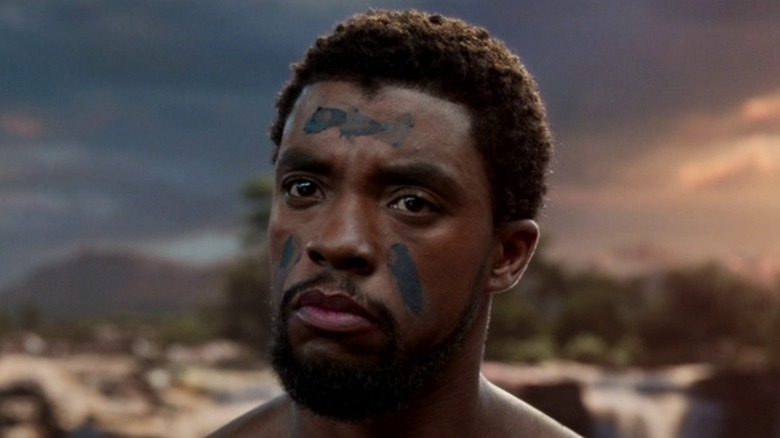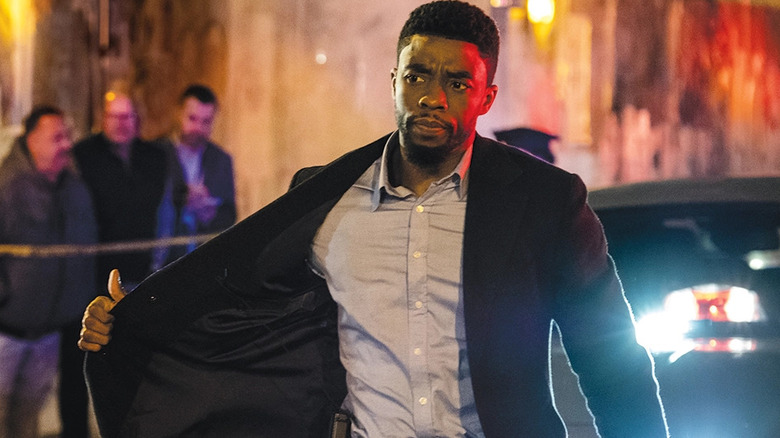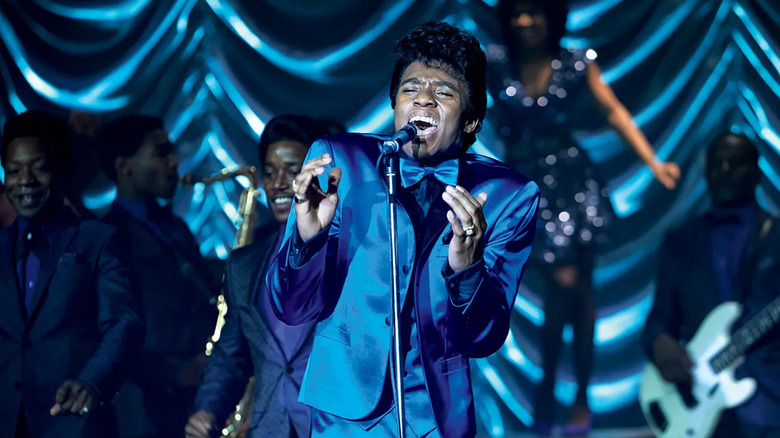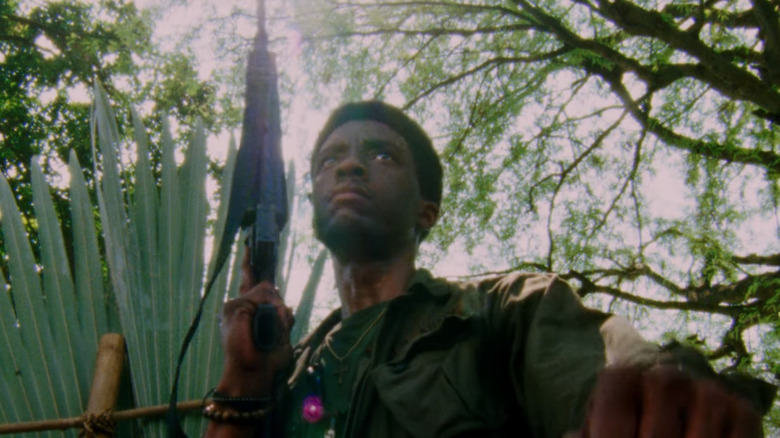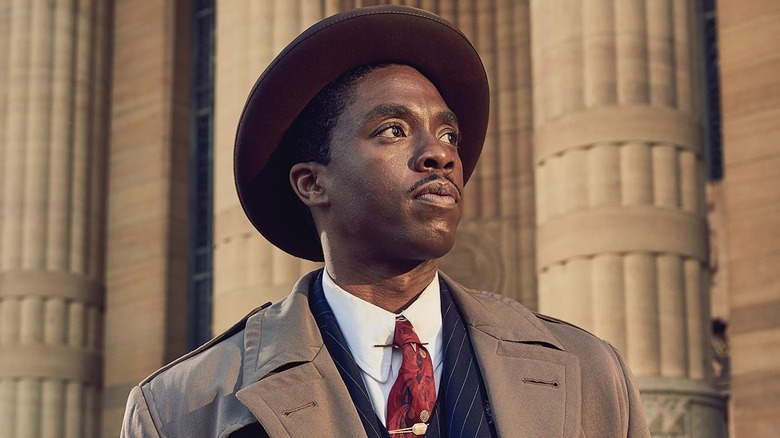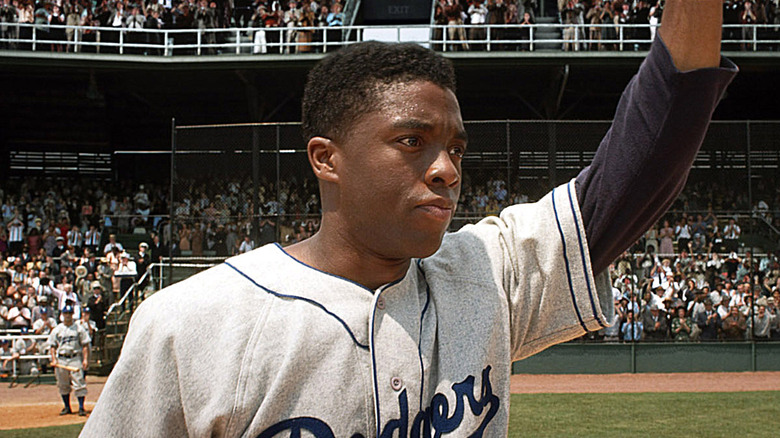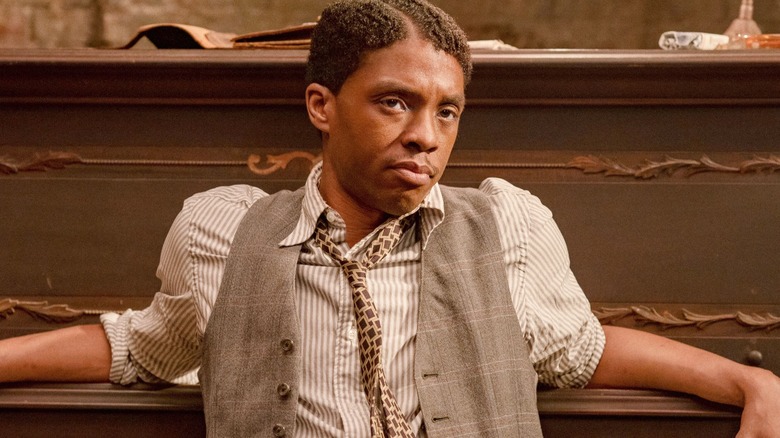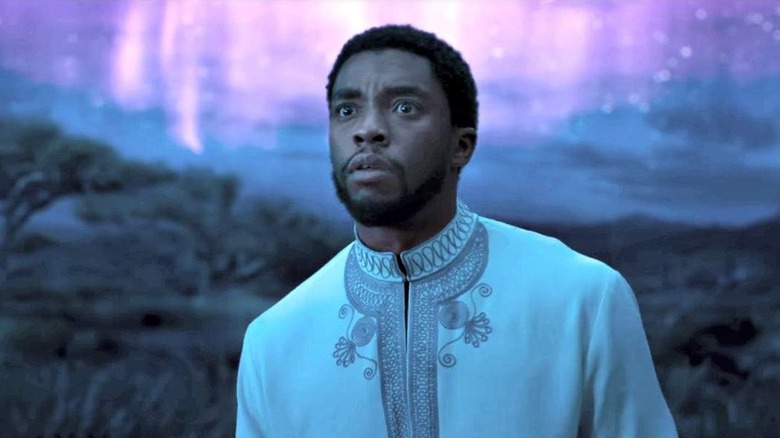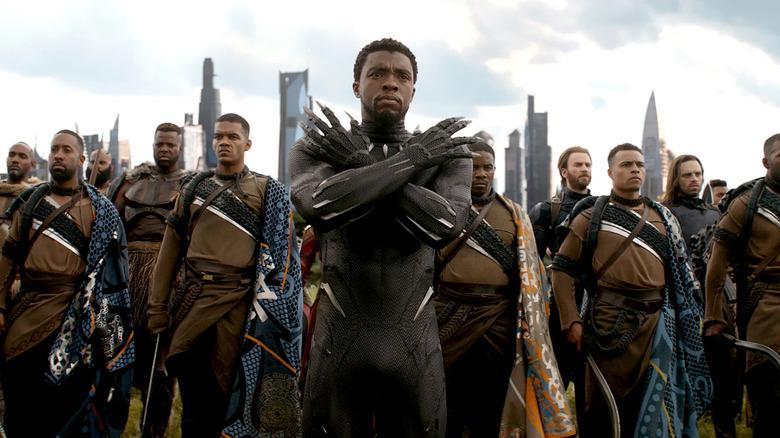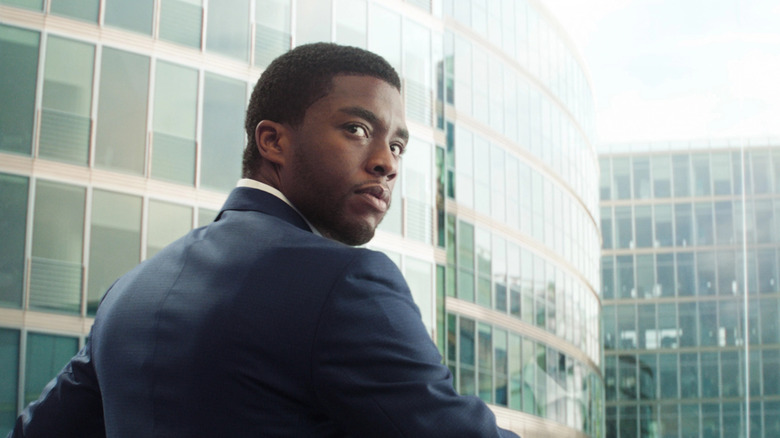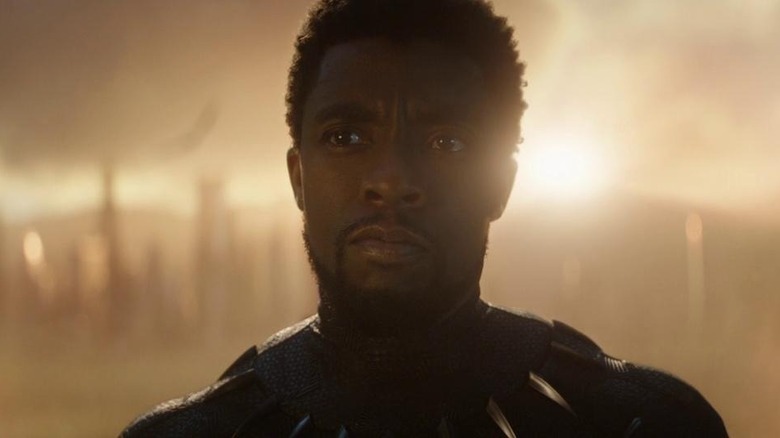10 Best Chadwick Boseman Movies On Rotten Tomatoes Ranked By Watchability
The world mourned when the shocking news broke that the actor Chadwick Boseman had passed away from colon cancer at the age of 43. His premature death was surely devastating for those who knew and loved him, but it was also an immense loss for those who appreciated his work in film, and one that was felt particularly acutely by the "Black Panther" star's young fans. In a tragically too-brief big screen career, Boseman managed to make an impressive number of movies, and an even more impressive percentage of those movies are held in high regard by both critics and audiences.
Chadwick Boseman had a keen instinct for choosing projects and was consistently excellent in everything to which he appeared. Though he'll undoubtedly be remembered for his stoic and otherworldly portrayal of T'Challa, Boseman also embodied great figured from American history as well as complicated characters created by prominent Black artists. One can only wonder what a multiverse in which Boseman's life and career would've lasted longer may have brought us. Nevertheless, his legacy as captured in film from 2012 to 2020 remains for us and for future generations to treasure and enjoy. These are the 10 best Chadwick Boseman films, according to both critics and audience scores on Rotten Tomatoes.
10. 21 Bridges
2019's "21 Bridges" is the kind of mid-budget movie and mid-level hit that movie stars tend to make when they reach a certain stratus of fame. Critics were mixed on this glossy crime thriller, but audiences were more receptive. It's Boseman's only producing credit (he co-produced with the Russo brothers), and it serves as a good example of the actor's range. Everyone already knew Boseman could shine in biopics and comic book movies, but the complicated action hero type in "21 Bridges" was something different for the actor.
Boseman plays Andre Davis, the son of a cop who was killed on duty, and who — after joining the NYPD himself — has earned a reputation for being trigger happy in the field. When a drug raid goes wrong and an officer is killed, the culprits flee from Brooklyn into Manhattan. Davis arranges for every bridge leading onto the island to be closed so that he, a narcotics agent, and the FBI can isolate them and trace their steps. But as the night unfolds, David becomes suspicious of his partner and his precinct Captain, so even when lives are in danger, it's in his best interests to not shoot and see the investigation through to the end. The film doesn't attempt to make a strong political statement on policing, but it's more nuanced on the topic than its premise suggests.
9. Get On Up
Music biopics are a genre that usually produces highly watchable, if somewhat formulaic, movies. Boseman stars as "Godfather of Soul" James Brown in 2014's regrettably underseen "Get On Up." It garnered particularly good reviews (viewers who did catch it were a little less taken), but, despite his lack of physical resemblance, Boseman got stronger praise than the film itself for his dynamic and committed performance. Though "Get On Up" just around in time, Boseman plays Brown from age 17 into his 60s. He does all of his own dancing and some singing (Brown's vocals were used for most of the soundtrack).
The film, which takes more creative risks than most biopics, is emotionally visceral due to Boseman's raw-nerved energy, as well as the fact that Brown's life was wilder than even your average tortured musician's. Brown grew up between brothels and churches, accustom to sex, violence, and abject poverty. He landed in jail before landing contracts as a bandleader, and he struggled to navigate a world in which white executives controlled and profited off of Black talent who performed for largely white audiences. As Brown rose to fame, his past demons rose to haunt him. "Get On Up" and Boseman show the singer at his best and worst, pushing music and racial relations forward and he set himself and his family back. The movie also features noteworthy performances by Aunjanue Ellie as Vicki Anderson and Brandon Mychel Smith as Little Richard respectively.
8. Da 5 Bloods
Spike Lee's "Da 5 Bloods" is an ambitious movie that might not be for everybody, but it still ranks among the prolific writer-director's (and Boseman's) best work. Critics loved it; the National Board of Review named it the best film of 2020, and its script, cast, and score were lauded throughout awards season. However, its nearly three hour runtime, extreme violence, and challenging tone and themes might've alienated some Netflix viewers. Chadwick Boseman isn't in it very much. He only appears in flashbacks in which Lee made the curious but effective choice not to de-age the other actors. But when Boseman is in the frame, he serves Lee's purposes beautifully and powerfully.
"Da 5 Bloods" follows a group of Black Vietnam veterans who return to the country in their old age on an official mission to recover their fallen comrade's remains. Really, they're hoping to dig up a substantial treasure they buried years ago during a battle in which their friend, Stormin' Norman (Boseman), was killed. The plot is plenty exciting (it's a throwback to classics like "The Treasure of the Sierra Madre"), but more importantly, it's a device through which Lee can examine some of his historical and cultural interests. "Da 5 Bloods" holds a magnifying glass to America's involvement in Vietnam, the experience of Black soldiers, and the cumulative effects of PTSD on one elderly Black soldier in particular. Boseman is practically mythical as Norman, but this is Delroy Lindo's movie and worth watching for his performance alone.
7. Marshall
2017's "Marshall" wasn't a box office hit, but the critics and audiences who sought out this biopic-courtroom drama hybrid ruled in its favor. Boseman plays Thurgood Marshall — eventual first African American Supreme Court Justice — in his days as an upstart lawyer for the NAACP. The film is as much about Marshall's origin story as it is about one of his first trials, the 1940 high profile case of Connecticut vs. Joseph Spell.
Spell had been accused of raping and attempting to murder a white woman named Eleanor Strubing by throwing her off of a bridge. He maintained his innocence, despite the evidence against him — which included his skin under her fingernails, bruising, and police records that showed she was in the back of the car he drove that night. Black citizens, including Black professionals, faced such prejudice at the time that Marshall wasn't permitted to speak at the trial and had to argue for his client through a white lead counsel whose expertise is insurance law. Through Marshall's probing, Spell and Strubing's real story emerges. The truth not only makes for a harrowing movie twist, it's an all-too-common example of the kind of bigotry that's plagued Black men for too much of the country's history.
"Marshall" is well-acted and solidly made, even if it is a little too by the book in its construction and surface level in its depiction of events (likely so that it could achieve its PG-13 rating for school-aged viewers).
6. 42
Chadwick Boseman starred in a biopic for the first time in his career (and the last time on this list) with 2013's "42," where he stepped into the cleats of boundary-breaking baseball player, Jackie Robinson. Branch Rickey (Harrison Ford), owner of the Brooklyn Dodgers, wants to integrate professional sports. He intends to recruit a player of color, and a sportswriter suggests Robinson. The promising infielder is instantly an outsider. He has a much easier time making the roster than he does finding acceptance from colleagues and fans. Some of his own teammates don't want to share the field with him, much less the locker room. Opposing teams injure him on purpose. Crowds yell slurs at him. And to make integration work, for the MLB and for society at large, his image has to be carefully managed in the press.
"42" is — like "Marshall" — another well-received, inspiring (if slightly old-fashioned) PG-13 version of a hero's journey that's nonetheless vital to understanding the American 20th century. The entire plot of this film has to do with the extent to which Robinson, the first Black major leaguer, had to suppress his feelings as he faced discrimination and abuse on an almost daily basis. Harrison Ford gets to go big as Rickey, but Jackie Robinson's story works on screen because Boseman is able to be so compelling whilst also being restrained — a skillset he would come to rely on in his most iconic role.
5. Ma Rainey's Black Bottom
"Ma Rainey's Black Bottom" is the poignant film adaptation of one of the plays in August Wilson's Pittsburgh Cycle, the second to be produced by Denzel Washington and Netflix after 2016's "Fences." But in the popular imagination, it's the movie for which Chadwick Boseman infamously didn't win an Oscar. After Boseman collected nearly every precursor trophy, that honor instead went to Sir Anthony Hopkins in a twist that surprised even the Academy, as they'd scheduled what was supposed to be his posthumous crowning at the very end of the night.
Boseman is the male lead and the tragic anti-hero, a trumpeter and songwriter named Levee. Young and brash, talented but over-confident, Levee can't understand why white music executives won't pay him fairly for his modern songs, or why he's stuck playing backup to the older, more traditional Ma Rainey. Boseman excels at playing the steady hand, but here, he wears Levee's every unstable emotion on the outside and positively vibrates with hope and pain in a way that underscores the very point of the movie. "Ma Rainey" has much in common with "Get On Up" subject matter-wise. Wilson was inspired by the titular blues singer's life story and career. But with his brilliant script as its source material, "Ma Rainey" goes deeper and gets more philosophical. The piece is in debate with itself about individual versus collective responsibility in social justice movements, and it hinges on Chadwick Boseman's most critically acclaimed performance.
4. Black Panther
2018's "Black Panther" is the Chadwick Boseman movie. It remains the only title in the MCU to be nominated for best picture. It's the highest rated one according to Rotten Tomatoes' critics, and prior to "Spider-Man: No Way Home" it was the highest grossing entry for a standalone character. Boseman's portrayal of T'Challa is so definitive, the studio chose not to replace him in planned sequels. Some fans complained about the shoddy CGI, and it should be noted that its still-high audience score is unreliably low because of some online trolls. Team-up movies also generally score better with Rotten Tomatoes users. Still, "Black Panther" arguably represents the pinnacle for the actor and the MCU.
In the wake of his father's death, T'Challa discovers that the King was a good but flawed man who left him a good but flawed kingdom. The worldbuilding of Wakanda is one of the film's many strong points. To make things right, the new King will have to learn when to fight and when to relent. What sets "Black Panther" apart is that its villain, Killmonger (Michael B. Jordan), is as sympathetic as its hero. Killmonger — avenging his father and angry about Wakanda's isolationism — is the juicier role, and Jordan makes the character his own. However, T'Challa — who mostly listens and learns — is the more difficult part, and Boseman is transcendent. "Black Panther" had the lofty job of diversifying Marvel's on-screen representation as well as the good fortune to be slotted into middle of the MCU's hottest streak, and it delivered.
3. Avengers: Infinity War
It's easy to forget how good 2018's "Avengers: Infinity War" is, as 2019's "Avengers: Endgame" came so soon after and overshadowed its critical and commercial success. The third "Avengers" installment boasts some of the most enjoyable MCU pairings. The Guardians of the Galaxy rescue Thor and spend a great deal of the movie being zany together. Tony Stark, Stephen Strange, and Peter Parker all get to know each other a little better, which is an opportunity for some top-notch banter. Wanda and Vision's love story is going strong. Speaking of which, Steve Rogers and Bucky Barnes get to see each other again.
A disproportionate amount of the MCU's most seminal moments occur in "Avengers: Infinity War," probably more than most fans remember. Thanos kills Loki. Red Skull reappears on Vormir. Bruce Banner suits up in the Hulkbuster armor. Vision and Heimdall meet their ends. And all of this is to say nothing of the snap! Everyone knew (and not only because of signed contracts) that our beloved Marvel characters weren't gone for good, but it's entirely possible that "Avengers: Infinity War" isn't thought of in the absolute highest regard only because it's the MCU's penultimate episode and not its finale of that era.
Chadwick Boseman is one of many assembling to stop Thanos, but he's as stately as ever. For his part, he leads his people into battle while his sister, Shuri, tries to remove the Mind Stone from Viz's forehead. That T'Challa is among the 50 percent of the population disappeared by the snap carries more weight after his passing.
2. Captain America: Civil War
2016's "Captain America: Civil War" marked Chadwick Boseman's debut as T'Challa and Black Panther. The actor was not yet a household name. To that point, he'd appeared in 2014's "Draft Day" as well as "42" and "Get On Up," but none of those films reached anything close to the size of Marvel's audiences. Functionally, "Captain America: Civil War" was his introduction to most moviegoers, and they took notice.
After the Avengers saved the day but with significant collateral damage in "Avengers: Age of Ultron," the United Nations drafts the Sokovia Accords to regulate them. This splits the supers into two camps, especially after Wanda accidentally damages a building and kills innocent bystanders trying to stop a terrorist. T'Challa comes onto the scene when he and his father, T'Chaka, attend the ratification ceremony in Vienna. It's also a terrorist target, and T'Challa transforms into Black Panther to pursue Bucky, who he believes to be the culprit. That aligns Black Panther with Tony, Black Widow, War Machine, Vision, and Peter Parker, who are all pro-Accord and after Bucky. The anti-oversight camp of Cap, Falcon, Wanda, Hawkeye, and Ant-Man goes rogue in hopes they'll find the brainwashed Winter Soldier first.
"Captain America: Civil War" isn't quite as loved as its predecessor, "Captain America: The Winter Soldier," which is often mentioned as a fan favorite, but it's very close. The movie featuring the most Avengers that isn't technically an Avengers movie is still one of the most watchable, and it contains a riveting chase scene that made a movie star out of Boseman.
1. Avengers: Endgame
Superhero and comic book movies, and Marvel movies specifically, dominated the decade in which Chadwick Boseman was a high profile actor. Maybe it's fitting that the capstone of the entire project is the highest rated in Boseman's filmography, factoring in the opinions of critics and fans. "Avengers: Endgame" had the highest of expectations riding upon it. The three hour-plus epic had to tie up just about every loose story thread that had been woven into 21 previous feature films. The MCU had made huge stars not only of its actors but also of its characters, and "Endgame" had to give each of them enough time to shine and leave them in a satisfying place. It had to top, or at least match, the quality of movies like "Black Panther" and "Infinity War" that had premiered to better-than-expected acclaim and astronomical ticket sales. And in the cinematic feat of the new century, it did everything it needed to do.
In "Endgame," the Avengers who survived the snap try against hope to reverse it. The quantum realm makes time travel possible, which means the culmination of Phase 3 is also a fun romp through the MCU's greatest hits, as our heroes revisit moments from movies past. Boseman's Black Panther isn't in it much (nor are any of the snapped superheroes), but he's part of that grand re-entrance in the final battle that will be remembered as one of the most applause-worthy moments in movie history. If only getting this gifted actor back was as easy as gathering some stones and opening a portal.
